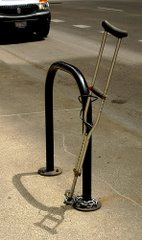
I should start out by saying that I'm not a big reader. Its always hit or miss with me on a book. Planet of the Blind by Stephen Kuusisto was definitely a hit. From the first chapters I was really engaged in literally a whole new world. Other books have done this by creating a fantasy landscape but this book paints a beautiful picture of the real world that the author, who is blind, experiences every day.
The eloquent and artful language and the deeply personal and even intimate stories really drew me into this world. My imagination did the rest to immerse me not in the visual pictures of what the author sees (although they sound beautiful) but in a feeling that was very new and exciting, something having to do with the totally out of control experience of "conquer[ing] space by hurtling through it," with only shadows and colors to guide him. What a fantastic feeling this evoked in me.
What I liked most about the book, beyond the way it played with my imagination, was the epic character arc that it unexpectedly crafted. We are graciously permitted to journey through the most private moments of Mr. Kuusisto's life as he struggles with his blindness and grows into accepting it. It is perhaps the most important strength about this book because it delivers a universal message of becoming and discovering who one really is. Just as a person with a disabilities is first and foremost a person, so did this book epitomize that by delivering a basic human story of self discovery and understanding with blindness providing the colorful accents. The story is in the end perhaps the most human of all stories and one that we all have the capacity to understand.
This book also gave me a great education in blindness. By not "teaching" blindness directly, I was able to learn as things came up in the story, but could always keep them in the context of a the author's life. I did not know that there were different types of blindness, or that there could be pain associated with it. I always thought it was just a peaceful darkness. I feel now like I've been given tools to understand blind people that I see in the world around me. Because of the book, I can make informed assumptions about them to plug my curiosity. Sure, the assumptions might not be true, as few of the assumptions we make about people are, however assumptions do make people in the world less scary and less intimidating. I think this stems from being most afraid of what we don't know, and to most able bodied people, disabilities are totally unknown. This book is a great step towards fixing that.
This is a great read on many levels, as beautiful prose, as compelling narrative, and as informative and "good" education. I highly recommend it.

1 comment:
I think the idea of delving into a disability through reading a book like this can be very successful in building awareness. It constructs a connection between you and the disabled. Granted, however, as you stated that there are many different types of blindness - so you can't really understand what it's like for any blind person; you are allowed to build EMPATHY - and this, I think, is the key to disability awareness.
Maybe you could explore the constructs of empathy between the disabled/abled population a bit more? I think that would be very interesting.
Post a Comment